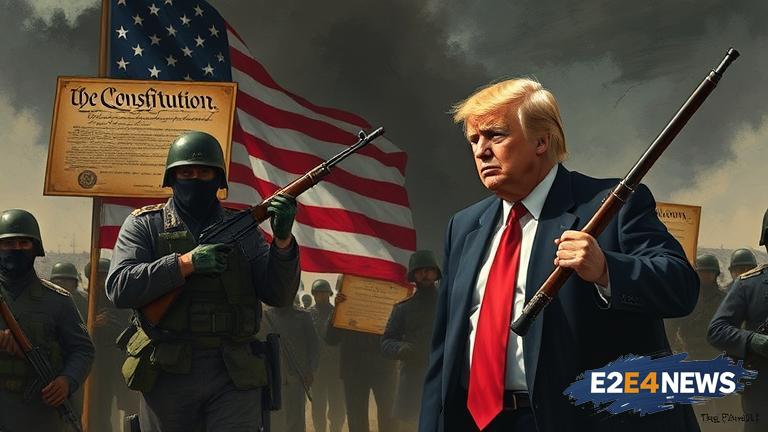The far-right militia movement in the United States has long been known for its fervent support of the Constitution and its interpretation of the document as a call to arms against government overreach. However, with the rise of Donald Trump, the movement’s allegiance has begun to shift from the Constitution to the former president. This shift has sparked concerns about the future of American democracy and the potential for violence. The movement’s leaders, such as Ammon Bundy and Richard Mack, have been instrumental in promoting this shift. Bundy, who led the 2014 standoff against the federal government at the Bundy Ranch in Nevada, has become a vocal supporter of Trump and has used his platform to promote the former president’s agenda. Mack, a former sheriff and founder of the Constitutional Sheriffs and Peace Officers Association, has also been a key figure in promoting the movement’s shift towards Trump. The movement’s support for Trump has been fueled by his rhetoric and policies, which have been seen as aligning with their anti-government and nationalist views. However, this shift has also led to a decline in the movement’s focus on the Constitution and its principles. The movement’s adherence to the Constitution has been replaced by a cult-like devotion to Trump, with many members seeing him as a symbol of their resistance against the government. This shift has sparked concerns about the potential for violence and the erosion of democratic norms. The movement’s leaders have been accused of promoting a form of ‘constitutional vigilantism,’ which holds that the Constitution gives individuals the right to take the law into their own hands. This ideology has been linked to several high-profile incidents of violence, including the 2014 standoff at the Bundy Ranch and the 2016 occupation of the Malheur National Wildlife Refuge in Oregon. The movement’s shift towards Trump has also led to a decline in its support for traditional conservative values, such as limited government and individual liberty. Instead, the movement has become increasingly focused on promoting a form of nationalist and populist ideology that emphasizes the need for a strong leader to protect American interests. This shift has sparked concerns about the potential for the movement to become a force for authoritarianism and anti-democratic sentiment. The movement’s leaders have been accused of promoting a form of ‘Trumpism’ that is incompatible with the principles of democracy and the rule of law. The rise of Trump has also led to a decline in the movement’s support for the Republican Party, with many members seeing the party as insufficiently committed to their cause. Instead, the movement has become increasingly focused on promoting a form of independent, populist politics that emphasizes the need for direct action and resistance against the government. This shift has sparked concerns about the potential for the movement to become a force for instability and violence in American politics. The movement’s shift towards Trump has also led to a decline in its support for traditional forms of activism, such as lobbying and grassroots organizing. Instead, the movement has become increasingly focused on promoting a form of direct action and confrontation, which has been linked to several high-profile incidents of violence. The movement’s leaders have been accused of promoting a form of ‘insurrectionism’ that emphasizes the need for individuals to take the law into their own hands and resist government authority. This ideology has been linked to several high-profile incidents of violence, including the 2014 standoff at the Bundy Ranch and the 2016 occupation of the Malheur National Wildlife Refuge in Oregon. The movement’s shift towards Trump has also led to a decline in its support for the principles of federalism and the rule of law. Instead, the movement has become increasingly focused on promoting a form of nationalist and populist ideology that emphasizes the need for a strong leader to protect American interests. This shift has sparked concerns about the potential for the movement to become a force for authoritarianism and anti-democratic sentiment. The movement’s leaders have been accused of promoting a form of ‘constitutional nihilism’ that rejects the principles of democracy and the rule of law. The rise of Trump has also led to a decline in the movement’s support for traditional forms of community and civic engagement. Instead, the movement has become increasingly focused on promoting a form of online activism and social media mobilization, which has been linked to several high-profile incidents of violence and harassment. The movement’s shift towards Trump has also led to a decline in its support for the principles of tolerance and inclusivity. Instead, the movement has become increasingly focused on promoting a form of nationalist and populist ideology that emphasizes the need for a strong leader to protect American interests. This shift has sparked concerns about the potential for the movement to become a force for division and hatred in American society.





